If you're a tech enthusiast, you've got to check out the 12 best hacking history books that chart the evolution of technology and cybersecurity. Titles like *Dark Territory* and *Fancy Bear Goes Phishing* offer deep insights into cyber warfare and hacking culture. Each book presents unique narratives that engage your curiosity and expand your understanding. Stick around, and you'll discover even more about the fascinating world of hacking and its impact on society.
Dark Territory: The Secret History of Cyber War

If you're someone who's fascinated by the intricate dance between technology and national security, Fred Kaplan's *Dark Territory: The Secret History of Cyber War* is a must-read. It dives into the origins of cyber warfare, tracing its roots alongside early computing and ARPANET. I found it eye-opening how concepts like logic bombs and malware emerged from fiction, highlighting real security challenges we face today. Kaplan reveals how U.S. policy has struggled to keep pace with cyber threats, often bogged down by bureaucracy. This compelling narrative urges us to rethink our approach to cyber defense and engage more actively in shaping effective strategies.
Best For: Individuals and policymakers interested in understanding the evolution of cyber warfare and its implications for national security.
Pros:
- Provides a compelling historical narrative about the origins and evolution of cyber warfare in the U.S.
- Highlights the complexities of cyber threats and the struggles of policy adaptation amidst bureaucratic challenges.
- Encourages active engagement from citizens and policymakers in addressing cybersecurity issues.
Cons:
- Offers a U.S.-centric perspective, lacking depth on foreign cyber capabilities and international dynamics.
- Minimal exploration of significant global cyber operations by other nations, limiting broader understanding.
- May leave readers wanting more comprehensive insights into the evolving nature of cyber warfare globally.
Fancy Bear Goes Phishing: The Dark History of the Information Age
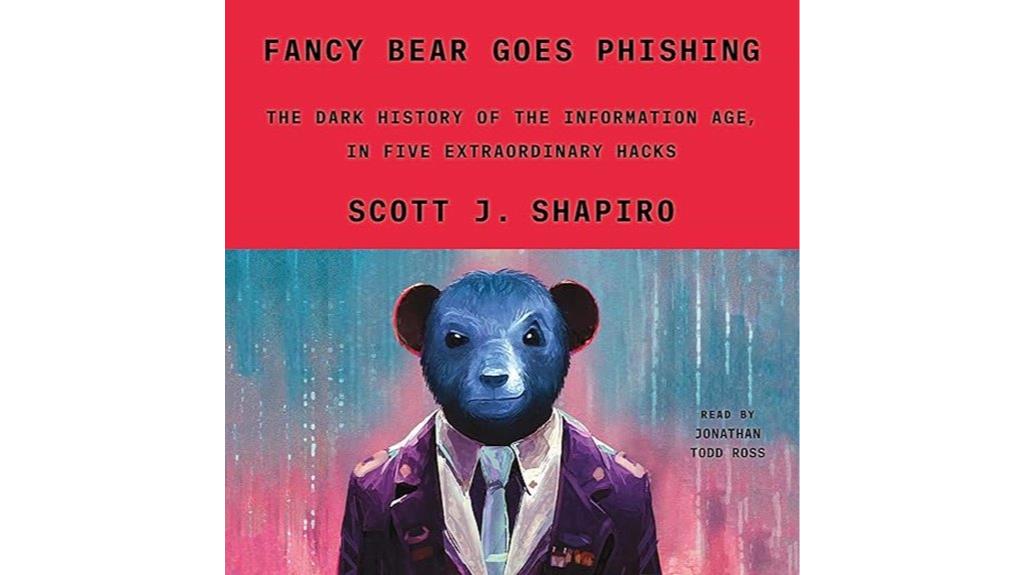
"Fancy Bear Goes Phishing" stands out as an essential read for anyone intrigued by the intricate dance between technology and human behavior in the domain of cybersecurity. Scott J. Shapiro dives into the dark history of hacking, weaving true crime with psychological insights. He emphasizes that cybercrime often reflects societal flaws, not just technical failures. While the book explores five crucial hacking incidents, I found the writing occasionally disjointed and jargon-heavy. Despite its flaws, it raises significant questions about our vulnerabilities and the human factors behind cyber offenses. For those passionate about hacking history, it's a thought-provoking journey worth taking.
Best For: Readers deeply interested in the intersection of technology, psychology, and cybersecurity, particularly those who enjoy historical narratives about hacking.
Pros:
- Engaging true crime narratives that illuminate the complexities of hacking incidents.
- Offers thought-provoking insights into the human factors driving cybercrime and societal vulnerabilities.
- Highlights the importance of cybersecurity awareness and understanding beyond technical solutions.
Cons:
- The writing can be disjointed and lacks cohesion, making it challenging to follow.
- Contains excessive jargon that may confuse casual readers rather than enhance understanding.
- Repetitive elements and unnecessary historical context can detract from the main narrative focus.
The Emergence of Probability: A Philosophical Study of Early Ideas about Probability
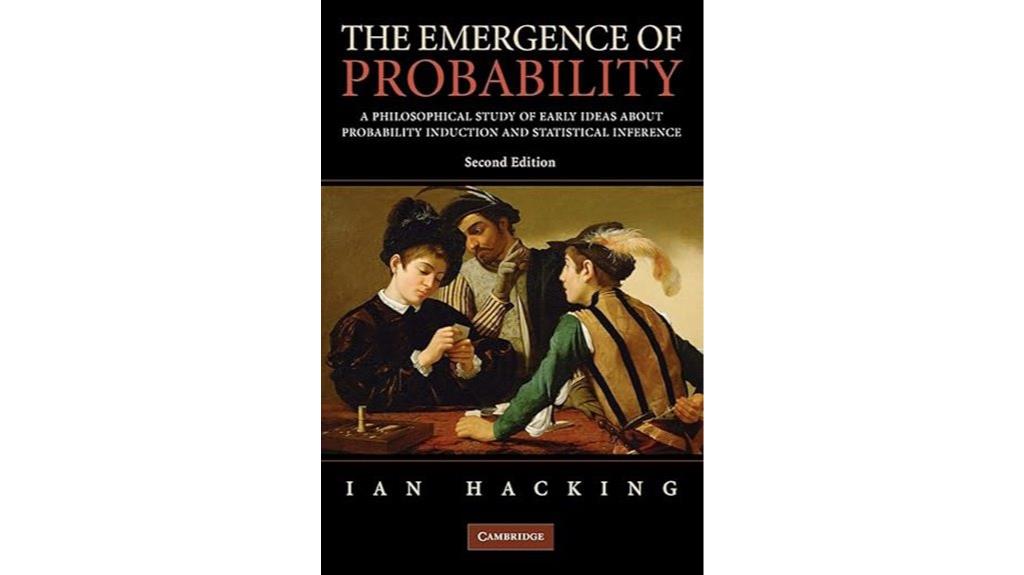
For those who seek a deeper understanding of probability's philosophical foundations, "The Emergence of Probability" by Ian Hacking stands out as a pivotal resource. This modern classic explores the Enlightenment's intellectual history of probability, connecting past ideas to current debates. Hacking examines key figures like Pascal and Leibniz, illustrating how their contributions shaped the discipline. He clearly distinguishes between frequentist and Bayesian concepts, emphasizing their relevance today. While some sections might challenge readers, the rich context Hacking provides makes it invaluable for anyone interested in the evolution of statistical thought. You won't want to miss this enlightening read!
Best For: Those with a solid understanding of statistics who seek to explore the philosophical foundations of probability theory.
Pros:
- Engaging narrative: Hacking presents complex ideas in an accessible and compelling manner.
- Historical insights: The book provides valuable context on the evolution of probability concepts through influential figures and their contributions.
- Relevance to modern statistics: It connects historical ideas to contemporary practices in frequentist and Bayesian statistics.
Cons:
- Challenging sections: Some readers may find the initial chapters difficult to navigate, particularly the discussions on induction and Hume.
- Requires prior knowledge: A solid understanding of statistics is necessary, which may limit accessibility for some readers.
- Dense bibliography: The extensive references may be overwhelming for those seeking a straightforward introduction to the topic.
Cult of the Dead Cow: How the Original Hacking Supergroup Might Just Save the World
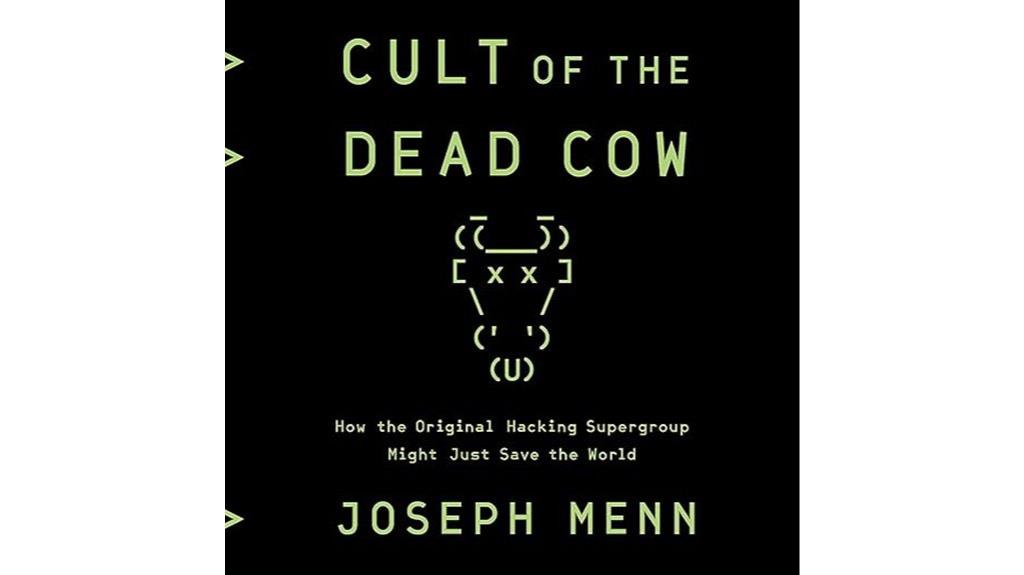
As someone deeply invested in the evolution of cybersecurity, I find "Cult of the Dead Cow: How the Original Hacking Supergroup Might Just Save the World" an essential read for anyone curious about the roots of hacker culture and its ethical implications. Joe Menn captures cDc's audacious spirit while examining the shift from hacking to ethical tech practices. Although the book faces challenges in covering the vast hacker landscape, it still offers valuable insights into technology's moral dilemmas. It's an engrossing narrative that, despite some gaps, highlights how hacker culture can inspire positive change in society. Immerse yourself; you won't regret it!
Best For: Individuals interested in the origins of hacker culture and its ethical implications in technology.
Pros:
- Engaging Narrative: The book offers a captivating storytelling approach that keeps readers invested in the history of hacker communities.
- Cultural Insights: Provides valuable perspectives on the ethical dilemmas faced by technologists and the impact of hacker culture on society.
- Historical Context: Highlights the transition from hacking to professional ethics, making it relevant for newcomers in the infosec field.
Cons:
- Incomplete Coverage: The narrative lacks comprehensive details about some key figures and events, potentially leaving readers wanting more context.
- Blurring of Groups: Distinctions between cDc and other hacker groups may confuse readers unfamiliar with the history.
- Footnotes Placement: Important information is relegated to the back, disrupting the main narrative flow and potentially detracting from the reading experience.
Cyberspies: The Secret History of Surveillance and Hacking
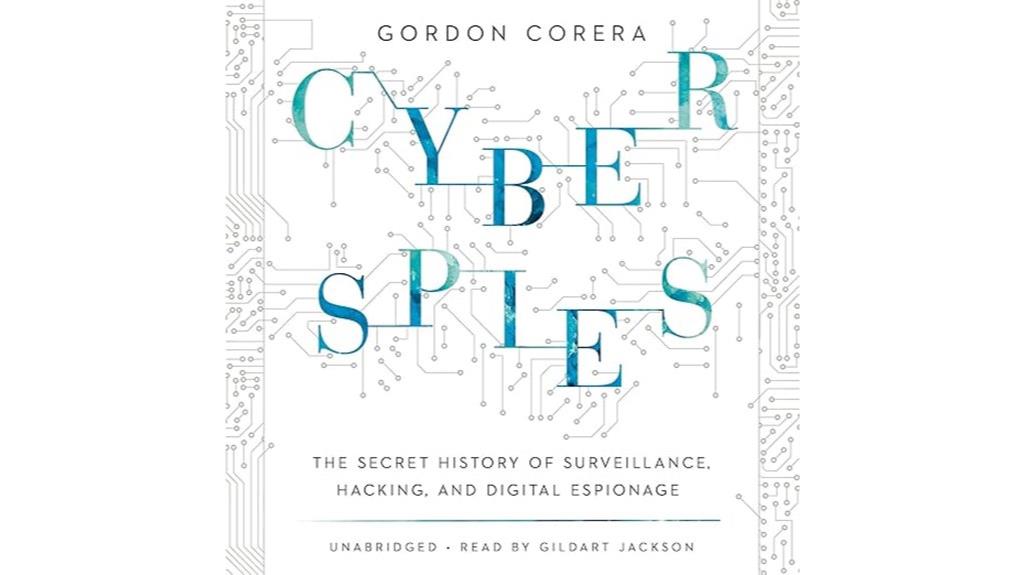
If you're intrigued by the intersection of technology and espionage, *Cyber Spies: The Secret History of Surveillance, Hacking, and Digital Espionage* by Gordon Corera is a compelling choice. This book chronicles the evolution of spying from WWII to 2015, starting with code-breakers at Bletchley Park. Corera highlights key events like the Cold War and the emergence of the internet, illustrating how methods and goals have transformed. He dives into cyber espionage's implications, stressing the need for strategic responses to threats. While some find it dense, it's a well-documented narrative that every tech enthusiast should consider adding to their reading list.
Best For: Readers interested in the historical context of espionage and the evolution of cyber warfare.
Pros:
- Well-researched: Offers a thorough documentation of the evolution of spying techniques and technology from WWII to 2015.
- Engaging narrative: Despite some critiques, many readers appreciate Corera's storytelling approach and the book's ability to intrigue tech enthusiasts.
- Timely subject: Addresses pressing issues related to cyber espionage and the need for strategic responses to emerging cyber threats.
Cons:
- Density: Some readers may find the narrative dense and difficult to navigate due to its extensive detail.
- Mixed reviews on organization: The book's structure may not resonate with all readers, leading to varied experiences.
- Bias concerns: Critics have pointed out a perceived bias, particularly regarding the portrayal of certain entities like Huawei, which may affect objectivity.
The Best of 2600: A Hacker Odyssey
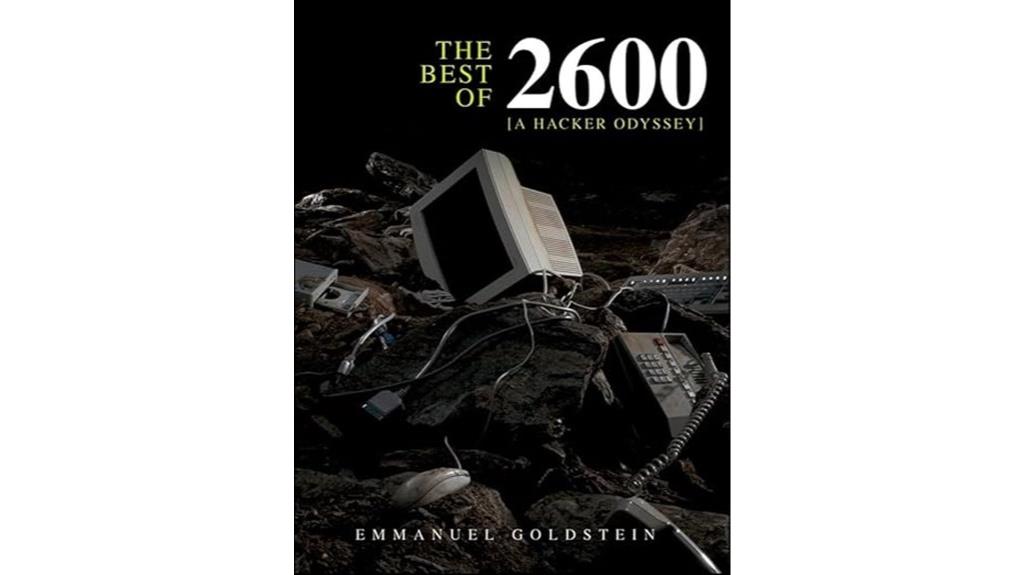
Anyone curious about the evolution of hacking culture and technology will find "The Best of 2600: A Hacker Odyssey" to be an invaluable resource. This collection of articles from the iconic 2600 magazine takes you on a nostalgic journey through decades of hacking, from early phone phreaking to the internet age. While some content feels outdated, it offers timeless insights into the hacker mindset and the political implications of computer crime. The humorous anecdotes and accessible writing make it enjoyable for everyone, regardless of their hacking background. It's a must-read for anyone wanting to grasp the essence of hacker culture.
Best For: Anyone interested in the history of hacking culture, technology evolution, and the hacker mindset, regardless of their technical background.
Pros:
- Engaging and humorous anecdotes that make the content accessible to a broad audience.
- Provides valuable insights into the hacker mentality and the political implications of computer crime.
- Offers a nostalgic look at the evolution of hacking from phone phreaking to the internet age.
Cons:
- Some content may feel outdated for modern readers.
- Not a practical how-to guide for hacking or illegal activities.
- A few readers find the overall content average and less impactful than expected.
A Vulnerable System: The History of Information Security in the Computer Age
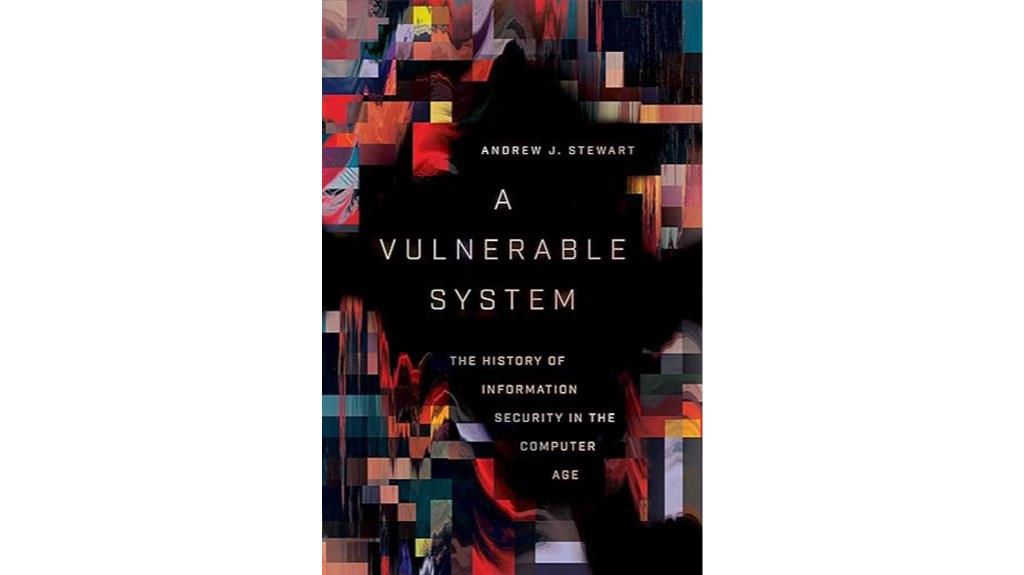
For anyone keen on understanding the evolution of information security, "A Vulnerable System: The History of Information Security in the Computer Age" by Andrew Stewart stands out as an essential read. The book traces the origins of information security while blending historical, technical, and business insights. I found Stewart's anecdotes and critical analysis engaging, shedding light on the complexities of vulnerabilities and the costs of breaches. Although some claim bias in his perspective, the book challenges superficial solutions and emphasizes the human element. It's a crucial resource for anyone wanting to improve their understanding of security and privacy moving forward.
Best For: Individuals and professionals seeking a comprehensive understanding of the history and complexities of information security.
Pros:
- Thorough Research: The book offers an in-depth exploration of information security, providing valuable insights into its evolution.
- Engaging Narrative: Stewart's writing style includes historical anecdotes that make complex topics more relatable and understandable.
- Critical Perspective: It challenges oversimplified security solutions and emphasizes the importance of considering the human element in security breaches.
Cons:
- Potential Bias: Some critics argue that the author's perspective may influence the account of information security history, leading to a lack of neutrality.
- Complexity: The intricate discussions and themes may be overwhelming for newcomers without a technical background.
- Focus on Past: While historical context is valuable, some readers might prefer more emphasis on contemporary solutions and future directions in security practices.
Hackers: Heroes of the Computer Revolution: 25th Anniversary Edition

"Hackers: Heroes of the Computer Revolution: 25th Anniversary Edition" stands out as an essential read for anyone seeking to understand the origins and evolution of the computing world. I love how it captures the thrill of early computing, from my first Timex Sinclair ZX81 to the Commodore 64. Levy's storytelling makes complex concepts accessible while celebrating the innovative spirit of hackers. Although it skips the UNIX era, the tales of pioneers and the hacker mindset resonate deeply. This book isn't just informative; it's an engaging exploration into the culture that shaped technology. It's a must-read for every tech enthusiast!
Best For: Tech enthusiasts, software developers, and computer science students seeking to understand the origins and culture of computing.
Pros:
- Engaging storytelling that makes complex technical concepts accessible to a wider audience.
- Provides valuable insights into the hacker mindset and its impact on software development.
- Captures the thrill of early computing and the innovation driven by pioneers in the field.
Cons:
- Lacks coverage of the UNIX era, which may disappoint some readers.
- Some readers found a tendency for hyperbole and excessive focus on personal quirks of characters.
- Formatting issues in the Kindle edition may detract from the reading experience.
Linux Basics for Hackers: Getting Started with Networking, Scripting, and Security in Kali

If you're a beginner enthusiastic to plunge into the world of Linux and cybersecurity, "Linux Basics for Hackers: Getting Started with Networking, Scripting, and Security in Kali" is your ideal companion. This book breaks down complex topics into accessible lessons, perfect for newbies and experienced users alike. It covers networking, scripting, and security principles specifically in Kali Linux, allowing you to apply concepts through hands-on exercises. What I love most is its emphasis on ethical hacking, urging responsible skill use. With clear tutorials and engaging style, it's an excellent foundation for anyone looking to dive deeper into the hacking world.
Best For: Beginners and aspiring professionals who want to learn Linux and cybersecurity fundamentals in an engaging and accessible manner.
Pros:
- Provides clear, step-by-step tutorials that make complex topics easier to understand.
- Emphasizes ethical hacking and responsible use of skills, fostering a positive approach to cybersecurity.
- Offers hands-on exercises that reinforce learning and allow immediate application of concepts.
Cons:
- May not cover advanced hacking techniques in depth, as it focuses on foundational knowledge.
- Some experienced users may find the content too basic for their level of expertise.
- Limited to the Kali Linux environment, which may not appeal to those using other Linux distributions.
Hacking Darwin: Genetic Engineering and the Future of Humanity
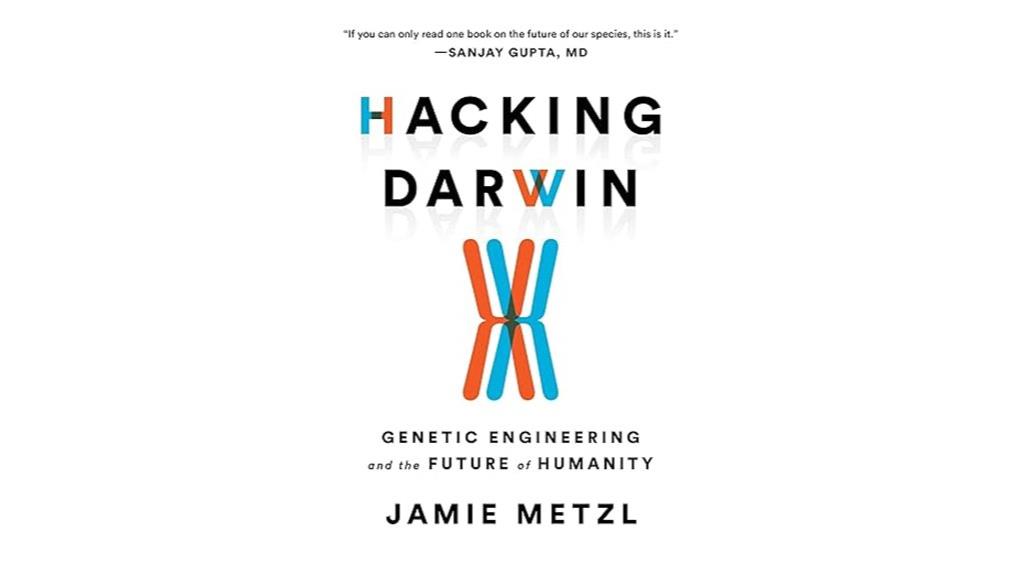
"Hacking Darwin" is an essential read for anyone curious about the future of humanity through the lens of genetic engineering. Jamie Metzl breaks down complex concepts, making them accessible and engaging. The book explores the transformative potential of genetic engineering, offering benefits like disease eradication and longer lifespans, while also addressing ethical dilemmas, such as embryo selection. It prompts us to reflect on our values amidst rapid advancements. I found it thought-provoking, perfect for sparking discussions in book clubs. Whether you're a science enthusiast or just curious, this book challenges us to contemplate the societal impacts of our genetic choices.
Best For: Individuals interested in the future of genetic engineering and its ethical implications, including families, educators, and book club members.
Pros:
- Engaging and Accessible: Jamie Metzl simplifies complex scientific topics, making them easy to understand for a wide audience.
- Thought-Provoking Discussions: The book encourages readers to reflect on their values and engage in meaningful conversations about genetic choices.
- Relevance to Contemporary Issues: Addresses current ethical dilemmas and societal impacts of genetic advancements, appealing to those concerned about the future of humanity.
Cons:
- Dense Material: Some readers may find the content overwhelming or challenging to digest due to the complexities involved.
- Potential for Controversy: The ethical questions raised may lead to discomfort or disagreement among readers with differing values and beliefs.
- Limited Technical Depth: Readers seeking in-depth scientific exploration might find the book lacks detailed technical analysis of genetic engineering technologies.
Photography: The Whole Story

For anyone enthusiastic to dive deep into the fascinating evolution of photography, "Photography: The Whole Story" offers an engaging and informative journey. This book serves as a solid foundation, perfect for students and enthusiasts alike. It presents concise sections on influential photographers and their works, tracing the impact of each period on the next. Despite some choppy writing, the narrative captivates and encourages exploration of photography theory. With rich illustrations and unique insights, it's a valuable addition to any collection. I highly recommend it for anyone wanting to enhance their understanding of photography's artistic journey.
Best For: Students and photography enthusiasts looking to understand the history and evolution of photography.
Pros:
- Concise delivery of information avoids unnecessary bloat commonly found in other anthologies.
- Offers unique insights into influential photographers and their contributions, enhancing the reader's appreciation of the art form.
- Features rich photographic illustrations that enhance the overall reading experience.
Cons:
- Some sections can feel disjointed, requiring careful reading to fully grasp the concepts.
- The writing style may be choppy at times, potentially disrupting the flow of information.
- Extensive coverage of early photography might include information that is readily available elsewhere.
Underground: Tales of Hacking, Madness and Obsession on the Electronic Frontier

Immerse yourself in "Underground: Tales of Hacking, Madness and Obsession on the Electronic Frontier," and you'll find a fascinating exploration perfect for anyone curious about the early days of hacking and its cultural implications. Suelette Dreyfus masterfully details the motivations of hackers and phreakers, bringing to life their thrilling escapades. The book not only highlights key figures like Julian Assange and Edward Snowden but also investigates the underground scenes of Australia and England. With gripping narratives and accessible technical insights, it's a must-read for anyone wanting to understand the origins and evolution of hacker culture.
Best For: Anyone interested in the history of hacking, cyber security, and the cultural implications of the hacker movement.
Pros:
- Engaging storytelling that captivates both technical and non-technical readers.
- In-depth research provides a rich historical context and insight into notable hacker figures.
- Accessible technical explanations make complex concepts easy to understand for all audiences.
Cons:
- Some readers may find the technical details too complex or overwhelming.
- The focus on specific regions like Australia and England might limit the broader context for some readers.
- The narrative may not appeal to those looking for a more traditional non-fiction format.
Factors to Consider When Choosing Hacking History Books

When I pick a hacking history book, I consider the author's expertise and background, as that often shapes the narrative's credibility. It's also essential to assess historical accuracy and the depth of coverage on key events. Finally, I look for a style that's engaging while balancing technical complexity and clarity, so I can fully grasp the content.
Author's Expertise and Background
Choosing the right hacking history book hinges on the author's expertise and background. I always consider the author's experience in hacking or cybersecurity, as their practical knowledge offers deeper insights into key events. Authors with a background in journalism or academia often provide critical perspectives and thorough research methodologies, enriching the narrative. If an author has been involved in notable hacking incidents or has firsthand experience within hacker communities, it adds authenticity to their storytelling. It's also essential to evaluate how well the author simplifies complex technical concepts, especially for those new to the subject. Finally, checking if they've published other works or been cited in reputable sources can indicate their credibility and recognition in the field.
Historical Accuracy and Depth
Evaluating the author's expertise sets the stage for understanding historical accuracy and depth in hacking history books. I always check the credentials of the author, as their background can greatly influence the reliability of the content. It's vital to look for books that offer a balanced view, integrating multiple perspectives to prevent a biased narrative. I also analyze how deeply the book dives into historical context, focusing on key figures, events, and technological advancements shaping hacking. Citations and bibliographic references are important too; well-researched texts typically include thorough sources supporting their claims. Finally, I appreciate books that cover both technical and cultural aspects of hacking, as this enriches my understanding of the motivations and societal impacts behind hacking history.
Narrative Style and Engagement
A compelling narrative style can truly make or break a hacking history book for me. When authors weave detailed research into engaging storytelling, like in *Underground*, I'm instantly drawn into the hacker culture. However, books that flip between technical jargon and philosophical musings, such as *Fancy Bear Goes Phishing*, can lose my focus. I appreciate humor and accessibility, as seen in *The Best of 2600*, which makes complex topics relatable for everyone. Engaging narratives that blend personal experiences with historical context, like in *Hackers: Heroes of the Computer Revolution*, humanize the subjects. Plus, I find that a well-organized structure helps me grasp the material without feeling overwhelmed, keeping my interest alive throughout the read.
Coverage of Key Events
When diving into hacking history books, it's vital to reflect on how thoroughly they cover key events that shaped the landscape of cybersecurity. I always look for books that explore significant milestones, like the early days of phone phreaking, the rise of computer viruses, and major cyber attacks such as Stuxnet. It's important that these books provide historical context, linking events to societal changes, such as the shift from pranks to organized cybercrime. I appreciate when authors discuss landmark incidents, hacker groups' influence on policies, and pivotal legal cases. Furthermore, exploring technological advancements and the motivations behind hacking incidents helps illuminate the ethical dilemmas we face today in the tech community.
Technical Complexity and Clarity
Hacking history books can be fascinating, but their value often hinges on how well they balance technical complexity with clarity. When I choose a book, I look for authors who can present intricate concepts in an accessible way. If a book throws around jargon without explanations, it can alienate casual readers like me. I also appreciate hands-on examples that enhance understanding, especially if I'm just starting out. A cohesive narrative makes it easier to follow, rather than jumping between complex details and abstract ideas. Finally, historical context is essential; it enriches my grasp of how hacking techniques and culture have evolved, helping me connect past events to today's cybersecurity landscape.
Ethical Considerations in Content
While exploring hacking history books, I always keep ethical considerations at the forefront of my mind. The portrayal of hacking can either frame it as criminal activity or social activism, shaping how we view hacking culture. I look for authors who emphasize the responsibility of technologists to evaluate their work's societal implications, promoting ethical hacking as a force for security and justice. It's essential to understand the white-hat versus black-hat debate, as it reveals the motivations behind hacking incidents. I also appreciate discussions on privacy rights versus security needs, prompting me to reflect on my values. Finally, I'm cautious of books that glorify illegal exploits, as they might inadvertently encourage reckless behavior among readers.
Relevance to Current Issues
As I navigate the world of hacking history books, I realize that their relevance to current issues is essential for understanding today's digital landscape. For instance, examining events like Russian interference in the 2016 U.S. election underscores the pressing cybersecurity concerns we face in modern politics. Books that investigate cyber warfare and U.S. military tactics shed light on national security challenges that are still significant. Furthermore, analyzing historical hacking narratives reveals the psychological factors fueling cybercrime, which resonate today. Exploring ethical dilemmas surrounding technology informs our discussions on responsible tech use and issues like genetic engineering. Ultimately, recognizing the historical context of cybersecurity equips us to tackle contemporary security challenges effectively.
Recommendations for Further Reading
Understanding the historical context of cybersecurity not only helps us grasp current issues but also guides our choices when selecting hacking history books. I recommend looking for titles that provide a thorough overview of hacking culture, like *Underground: Tales of Hacking, Madness and Obsession on the Electronic Frontier*, which captures early hackers' motivations. Consider works that blend technical insights with storytelling, such as *Fancy Bear Goes Phishing*. Books addressing ethical implications, like *Cult of the Dead Cow*, offer valuable perspectives on technologists' responsibilities. Don't overlook narratives covering significant historical events, as found in *Cyberspies: The Secret History of Surveillance and Hacking*. Finally, titles that focus on human factors, such as *Linux Basics for Hackers*, emphasize ethical hacking's importance.
Frequently Asked Questions
What Are the Most Influential Hacking Events in History?
When I think about the most influential hacking events in history, a few stand out. The 1983 ARPANET worm, the Morris Worm, really opened eyes to cybersecurity issues. Then there's the 1994 Credit Card Hack, which shook the financial world. I can't forget the 2007 Estonia cyberattacks that showcased state-sponsored hacking. Each of these events changed the landscape of technology and security, shaping how we think about online safety today.
How Do These Books Impact Modern Cybersecurity Practices?
When I think about the impact of historical hacking events, it's like watching a dark storm cloud roll in while a sunny day fades. Those books reveal past vulnerabilities and inspire modern cybersecurity practices. They teach us to anticipate threats and adapt defenses. I've learned that understanding history helps me recognize patterns and prepare for future challenges. By studying these events, I'm better equipped to protect our digital landscape today.
Are There Any Notable Authors in the Hacking Genre?
Absolutely, there are some standout authors in the hacking genre. I've always admired Kevin Mitnick for his gripping storytelling and insights into social engineering. Bruce Schneier's works are also invaluable; he dives deep into security and privacy issues. Then there's Cory Doctorow, whose fiction often bridges technology and activism. Each of these authors brings a unique perspective that not only educates but also captivates readers like me who are passionate about cybersecurity.
What Is the Importance of Hacking Ethics in Literature?
Hacking ethics in literature really shapes how we view technology and its impact on society. I believe these stories challenge our perceptions of right and wrong in the digital age. They often highlight the fine line between curiosity and criminality, sparking discussions about privacy, security, and responsibility. By exploring these ethical dilemmas, we can better understand the consequences of our actions, making us more thoughtful and informed individuals in an increasingly connected world.
How Can I Apply Lessons From These Books in Real Life?
I've found that applying lessons from literature on hacking can be transformative. By understanding ethical dilemmas faced by hackers, I've learned to navigate my own tech challenges with integrity. These stories inspire me to think critically about the impact of technology on society. I often reflect on the decisions made by historical figures, which helps me stay grounded and responsible in my choices. Embracing these principles has shaped my approach to technology and ethics.
Conclusion
In exploring these fascinating books on hacking history, I've discovered how deeply intertwined technology and society truly are. Each title offers unique insights into the minds that shaped our digital world. Whether you're a tech enthusiast or just curious, you'll find stories that challenge your perceptions. So, are you ready to plunge into this thrilling journey through the shadows of cyberspace and uncover the secrets that have shaped our modern age? Don't miss the adventure!








